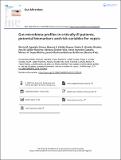Por favor, use este identificador para citar o enlazar a este item:
http://hdl.handle.net/10261/206413COMPARTIR / EXPORTAR:
 SHARE SHARE
 CORE
BASE CORE
BASE
|
|
| Visualizar otros formatos: MARC | Dublin Core | RDF | ORE | MODS | METS | DIDL | DATACITE | |

| Título: | Gut microbiota profiles in critically ill patients, potential biomarkers and risk variables for sepsis |
Autor: | Agudelo Ochoa, Gloria M.; Valdés Duque, Beatriz E.; Giraldo, Nubia A.; Jaillier Ramírez, Ana M.; Giraldo Villa, Adriana; Acevedo Castaño, Irene; Yepes Molina, A.; Barbosa, Janeth; Benítez Páez, Alfonso | Palabras clave: | Intestinal microbiota Intensive care unit Critically ill patient Sepsis Antibiotics |
Fecha de publicación: | 10-ene-2020 | Editor: | Taylor & Francis | Citación: | Gut Microbes 12 (1): 1707610 (2020) | Resumen: | Critically ill patients are physiologically unstable and recent studies indicate that the intestinal microbiota could be involved in the health decline of such patients during ICU stays. This study aims to assess the intestinal microbiota in critically ill patients with and without sepsis and to determine its impact on outcome variables, such as medical complications, ICU stay time, and mortality. A multi-center study was conducted with a total of 250 peri-rectal swabs obtained from 155 patients upon admission and during ICU stays. Intestinal microbiota was assessed by sequencing the V3-V4 hypervariable regions of the 16S rRNA gene. Linear mixed models were used to integrate microbiota data with more than 40 clinical and demographic variables to detect covariates and minimize the effect of confounding factors. We found that the microbiota of ICU patients with sepsis has an increased abundance of microbes tightly associated with inflammation, such as Parabacteroides, Fusobacterium and Bilophila species. Female sex and aging would represent an increased risk for sepsis possibly because of some of their microbiota features. We also evidenced a remarkable loss of microbial diversity, during the ICU stay. Concomitantly, we detected that the abundance of pathogenic species, such as Enterococcus spp., was differentially increased in sepsis patients who died, indicating these species as potential biomarkers for monitoring during ICU stay. We concluded that particular intestinal microbiota signatures could predict sepsis development in ICU patients. We propose potential biomarkers for evaluation in the clinical management of ICU patients. | Versión del editor: | https://doi.org/10.1080/19490976.2019.1707610 | URI: | http://hdl.handle.net/10261/206413 | DOI: | 19490976.2019.1707610 | ISSN: | 1949-0976 |
| Aparece en las colecciones: | (IATA) Artículos |
Ficheros en este ítem:
| Fichero | Descripción | Tamaño | Formato | |
|---|---|---|---|---|
| GutMicrob2020-Agudelo.pdf | Artículo principal | 4,2 MB | Adobe PDF |  Visualizar/Abrir |
CORE Recommender
Page view(s)
122
checked on 20-may-2024
Download(s)
233
checked on 20-may-2024
Google ScholarTM
Check
Altmetric
Altmetric
Este item está licenciado bajo una Licencia Creative Commons

